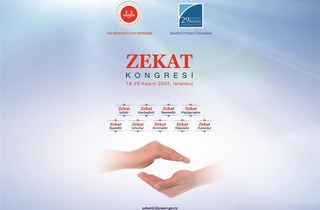Congress which will be held in Istanbul 29 Mayıs University will start with the opening speech of the President of Religious Affairs Prof. Dr. Ali Erbaş.
Congress will continue with 6 sessions after the opening conference titled “Basic Principles and Unique Aspects of Islamic Economy”.
After the sessions of “Zakat and Individual”, “Zakat and Society”, “Zakat and Religious Education”, “Zakat and Fiqh”, “Zakat Practices and Religious Affairs in Turkiye” congress will be concluded with an ‘Evaluation’ session.
The Congress, which also has international attendance, will last for 3 days.
What is Zakat?
Zakat is one of the five fundamental concepts (also known as the 5 pillars) in Islam. This makes it a compulsory act, and therefore, all Muslims must give Zakat, provided they meet certain conditions. The concept of Zakat is to purify one’s wealth and soul. The calculation of Zakat is based on the total savings of a Muslim during one lunar (Islamic) year. It is important to note that only the beginning and end of the year are taken into account. Muslims must possess a minimum “Zakatable” amount of wealth, both at the beginning and at the end of their Zakat year, for them to pay Zakat. Items like gold, silver, paper currency held in cash or in the bank, tradable assets owned by a business, crops, and herded animals, are all taken into consideration when calculating Zakat.
“The alms are only for the poor or needy; and the destitute; and those employed to collect Zakat; and to attract the hearts of those who have been inclined towards Islam, and to free the captives; and for those in debt; and for Allah’s Cause; and for the wayfarer, a traveler who is cut off from everything; a duty imposed by Allah. And Allah is All-Knower, All-Wise.” (Al-Quran 9:60)
According to the Holy Quran, a Muslim should give Zakat to the following types of people:
Fuqara: Translated as the ‘poor’ or ‘needy’, these people have some money, but not sufficient for their everyday needs.
Al-Masakin: Translated as the ‘destitute’, these are people of extreme poverty who possess no wealth at all, and are in need of asking others for food, clothing and shelter.
‘Amil Zakat: These are people appointed by an Islamic Head of State or Government to collect Zakat. The authority gives them a fee for their work, which includes collecting, recording, guarding, dividing and distributing Zakat.
Mu’allaf: These are people who have just become Muslim, or those whose circumstances are so desperate they fear turning to crime if they are not helpful.
Ar-Riqaab: These are slaves whose masters have agreed to set them free on a payment of a fixed amount. Zakat may be used to purchase their freedom.
Ibnus-Sabeel: Translated as the ‘wayfarers’, these are travelers stranded in a foreign land in need of money. These people can receive Zakat if the purpose for traveling is lawful.
Al Ghaarimeen: These are the debtors, people burdened by debts because of personal needs or social necessity. These people are given Zakat if they do not have enough money beyond their basic needs to repay debts. Help is also provided to those who may have landed themselves in debt as a result of social obligations such as supporting an orphan or renovating a school. It is conditional that the debts were not created for any un-Islamic or sinful purpose.
Fi Sabeelillah: These are people who are away from home in the path of Allah. Those in Jihaad, those seeking knowledge or stranded in Hajj, may be assisted with Zakat when in need. (ILKHA)



 Güncel
Güncel
 Dünya
Dünya
 Güncel
Güncel
 Güncel
Güncel
 Güncel
Güncel
 Güncel
Güncel
 Spor
Spor
 Dünya
Dünya
 Güncel
Güncel
 Spor
Spor





